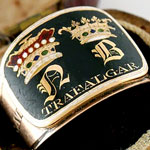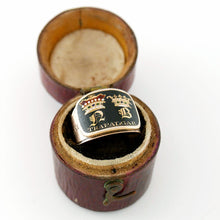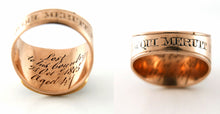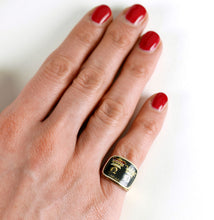Admiral Viscount Nelson Memorial Ring, 1806
Adding product to your cart
Gold and enamels. The black enamel rectangular bezel inscribed ‘TRAFALGAR’ and decorated with the Gothic letters ‘N’ and ‘B’ for Nelson and Bronté respectively surmounted by a viscount’s coronet and a ducal coronet; the interior further inscribed ‘Lost to his Country 21 Oct 1805 Aged 47’, and the outer shank engraved with Nelson's motto 'PALMAN QUI MERUIT FERAT' (Let him bear the palm of victory who has won it). Diameter: 20mm.
After Nelson was killed at Trafalgar, his family arranged for gold and enamel rings to be distributed in his memory to thirty-one relatives and twenty-seven close associates including brother officers, lawyers and prize agents. The rings were produced by the London goldsmith John Salter (fl. 1802-1827) of 35 Strand, London. An original manuscript listing recipients of the rings, including friends, family members and fellow officers, survives at the British Library.
Read more
It is difficult to appreciate today the symbolic significance of the victory at Trafalgar to the British nation in 1805. Nelson was worshiped as a secular deity, the saviour of the nation. His victory guaranteed British control of the seas and created a global maritime power that endured unchallenged for over a century.
Despite persistent seasickness, his career flourished as he moved from ship to ship in the East Indies and the Caribbean, showing a flair for naval strategy. He became one of the youngest captains in the Royal Navy. He saw active service in the American War of Independence, in the wars of the French Revolution and in battles in the East Indies, the Caribbean, the Mediterranean and the Atlantic.
Before the battle of Trafalgar, Nelson made his famous signal to the fleet: ‘England expects that every man will do his duty. ’ He received his fatal wound as he paced the quarter-deck with Captain Hardy. A French musket ball struck the epaulette on his left shoulder and penetrated his chest. He fell face down on the deck. Hardy was a few paces ahead and to his right. On turning round he saw Sergeant Major Secker of the Marines and seamen raising Nelson. When Hardy expressed the hope that Nelson’s wound not too severe, he replied: "They have done for me at last, ... my backbone is shot through." Carried below to Victory’s orlop deck, he lived just long enough to hear the news of the surrender of more than a dozen enemy ships, permitting him to utter “Thank God I have done my duty." When the news of his death reached England, the King wept, as did thousands who lined the route of his state funeral in January 1806.








